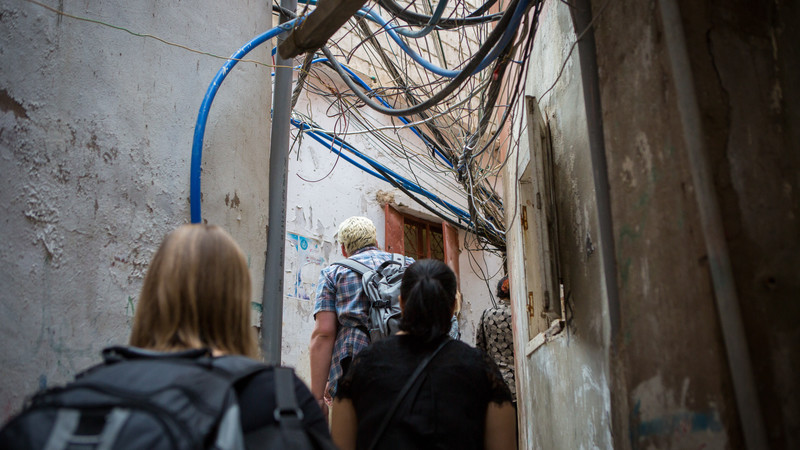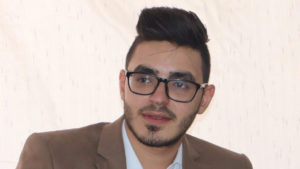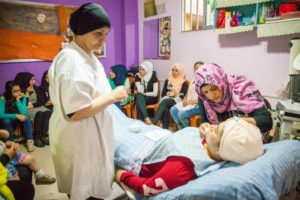“When they heard my Palestinian accent, they didn’t call back”

Richard Sloman is CAFOD’s Middle East Programme Officer. Here he reflects on his time in Lebanon where almost 40 per cent of the population are Syrian and Palestinian refugees. Richard visited one of Lebanon’s twelve Palestinian refugee camps – home to 450,000 people, one in ten of the country’s population.
Bourj el Barajneh in Beirut, Lebanon is one of the world’s oldest refugee camps. Established in 1948, it’s home to more than 31,000 people. These women, men and children live in just one square kilometre of land. That’s roughly 31 people for every square metre of earth.
Please give to CAFOD’s Advent appeal to help people living in poverty
I made my way through its streets lined with precariously built homes. Some were so tall and tightly packed together that I could just see small amounts of sunlight trickle down to the streets and alleyways below.
But it wasn’t the sheer density of people that first struck me as I walked in, it was all the Palestinian flags hanging from the buildings.
The people in the camp – many of whom were born here in Beirut – are proud of their Palestinian heritage.

“When they heard my Palestinian accent, they didn’t call back”
I was in Bourj el Barajneh to visit CAFOD’s long-term partner, Association Najdeh – an inspirational Palestinian women’s organisation who work with refugees, especially women, to help them achieve equal rights as well as participate in their communities at an economic, social and political level.
Omar is 22 years old and volunteers with Association Najdeh. Like so many people here in the camp, he is highly qualified – an IT graduate. He said to me: “After graduation I submitted my CV to a number of organisations and received some calls to discuss job opportunities. When they heard my accent, and found out that I was Palestinian, they never called back.”
Please give to our Advent appeal
Despite being born in Lebanon, Omar is classed as a foreigner. Discrimination against Palestinians continues to be commonplace. Omar told me that his Lebanese university friends refuse to come to his house in the camp as they were either frightened, wrongly associating refugees in the camp as dangerous, or forbidden by their parents to go there.
The great majority of refugees live in poverty, with inadequate housing conditions, limited access to services such as health care and are subject to discriminatory laws that don’t allow them to get jobs. This situation is closely linked to their employment status which is characterised by low pay, poor conditions and lack of opportunities.
Fighting for justice
As part of the Right to Work Campaign run by our partner, Omar and his friend Hanin have been running university campus talks to call for a change in Lebanese employment. They also run an active social media campaign which has over 52,000 followers online. The campaign helps to train young Palestinian refugees on Lebanese employment laws and lobbies a variety of people including government officials to change the law.
Campaigns like this one work: in 2010, campaigns, and the work of Association Najdeh, helped to bring about change in the Lebanese employment law, meaning some Palestinians could register for work permits in specific sectors such as nursing and gave access for Palestinians to the government’s Social Security Fund. Despite this success, work permits are still very limited, and it is illegal in many sectors for Palestinians to work at all. Amina and Omar are hopeful that this latest campaign, as well as challenging negative stereotypes, will lead to similar changes in the law.

Refugees can now get jobs
In some vocations, with the right skills, young Palestinians can find work and Association Najdeh, with support from CAFOD, provides young women with vocational skills including hairdressing and make up classes. At the centre, the women also discuss their rights and problems they face in the community such as violence. They are also offered career guidance and psychological support if they need it.
And there has been so much progress in a short space of time. This year, over 230 young people have completed vocational training, more than 500 received career counselling and over 130 people have found employment as a result. With CAFOD’s support, these young refugees now have the skills to contribute to the family income in the future.
Integration is about welcoming difference
As I left the bustling camp with the Palestinian flags fluttering proudly from the roof tops, I was reminded that integration is not about suppressing one’s own identity, but it is about knowing each other better and welcoming differences as well as similarities.
Follow our 2017 online Advent calendar to reflect, pray and take global justice actions throughout this holy season.